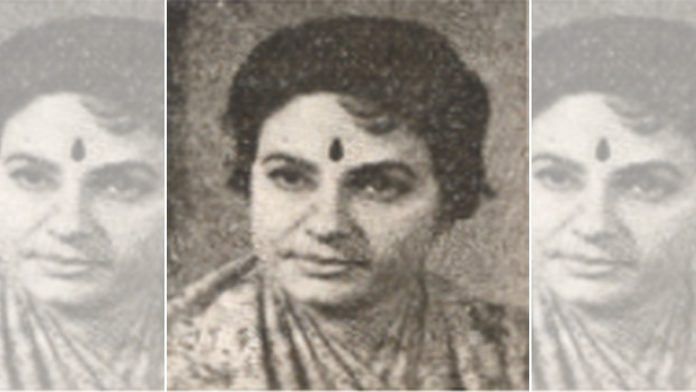New Delhi: On this day 95 years ago, Bihar saw the birth of Tarkeshwari Prasad Sinha, a freedom fighter who became a fiery politician after independence, served as a member of then Prime Minister Jawaharlal Nehru’s council of ministers, and was a four-time Member of Parliament.
After former Prime Minister Indira Gandhi, Sinha was considered the only woman politician of note in the Indian political landscape at the time.
Her public life started to take shape during the 1942 Quit India Movement, when she played an active role as a student leader in Patna Women’s College, at the age of 16.
After India gained independence in 1947, Sinha was elected to the first Lok Sabha in 1952 from the Patna East seat, defeating freedom fighter Sheel Bhadra Yajee, on a Congress ticket with a 46.90 per cent vote share. She was 26.
Sinha was re-elected to the Lower House in 1957, 1962 and 1967 from Barh constituency, winning each election with a high margin.
While filmmaker and lyricist Gulzar’s critically acclaimed film, Aandhi (1975), is often believed to have been inspired by Indira Gandhi, Sinha too was an inspiration for the film’s protagonist.
Also read: Savitri stood out when South film was ruled by NTR, Nageswara Rao. Movies waited for her
Early activism and move to politics
Born to a surgeon on 26 December 1926, Sinha had a master’s degree in political science and was married to a lawyer, Nidhi Dev N. Sinha.
According to a 1971 profile that appeared in the New York Times, it was her father who initiated her into politics while she was still in school, making her read German philosopher and economist Karl Marx.
As a student leader, Sinha started off as the president of the Bihar student Congress and even received Mahatma Gandhi in Nalanda during the Partition riots in 1947.
Sinha was a prominent member of the Congress party, according to the NYT profile, which described her as a glamorous woman with a tough spirit and fiery tongue. She had soft features and a mellifluous voice and yet was a strong orator, who was an integral pioneer of student movements in Patna. However, she chose to quit politics later and focused on social work.
“Parliament is a very hard taskmaster…. One must be able to talk constantly and one must learn how to talk,” she told NYT.
Sinha was the first female deputy finance minister, between 1958 and 1964, when Morarji Desai held the portfolio. According to an Inuth report, Sinha used to barge into offices of government officers and question them over the functioning of their departments.
Differences with Indira Gandhi
When the Congress split in 1969, Sinha stayed with the old guard, Morarji Desai and K. Kamraj, while Indira Gandhi formed her own party.
Known for speeches filled with Urdu couplets, Sinha was a vehement critic of Indira Gandhi.
“The people’s verdict has always been responsible-even in 1977-because it helped us revitalize the party. The people have never erred collectively,” she told India Today in 1978. The report called her Gandhi’s ‘alter ego’.
Sinha was considered close to Morarji Desai, and even had an alleged affair with Lok Sabha MP and Indira Gandhi’s husband Feroze Gandhi.
In 1971, Sinha suffered her first electoral defeat to Congress candidate Dharamvir Sinha, from the Begusarai seat. She lost again in 1977 and 1978 from Begusarai and Samastipur, respectively. Soon, Sinha withdrew from politics and set up a hospital in Nalanda that offered free treatment. She died on 14 August 2007.
Also read: MC Reddy led Telangana Agitation. Indira Gandhi was smarter—she made him UP Guv instead



